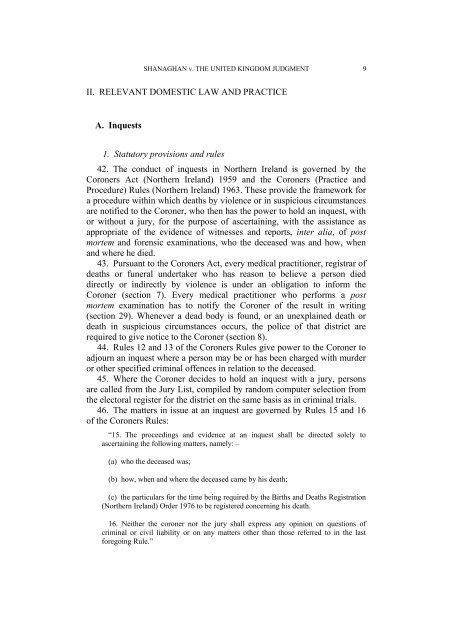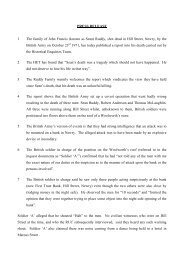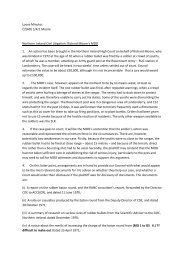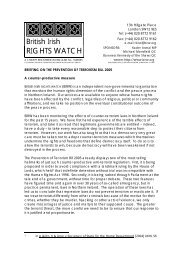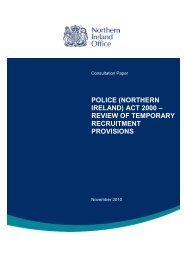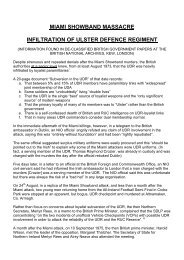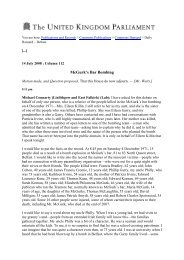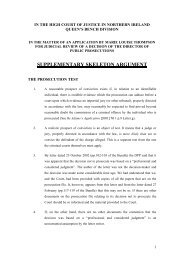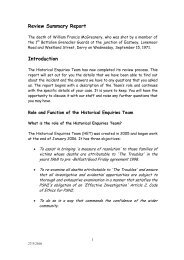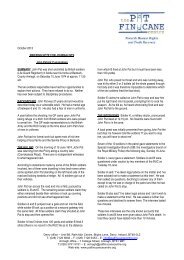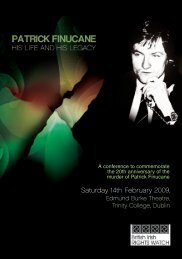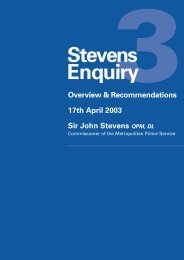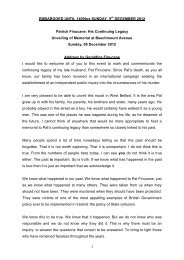Patrick Shanaghan v the United Kingdom - The Pat Finucane Centre
Patrick Shanaghan v the United Kingdom - The Pat Finucane Centre
Patrick Shanaghan v the United Kingdom - The Pat Finucane Centre
You also want an ePaper? Increase the reach of your titles
YUMPU automatically turns print PDFs into web optimized ePapers that Google loves.
SHANAGHAN v. THE UNITED KINGDOM JUDGMENT 9<br />
II. RELEVANT DOMESTIC LAW AND PRACTICE<br />
A. Inquests<br />
1. Statutory provisions and rules<br />
42. <strong>The</strong> conduct of inquests in Nor<strong>the</strong>rn Ireland is governed by <strong>the</strong><br />
Coroners Act (Nor<strong>the</strong>rn Ireland) 1959 and <strong>the</strong> Coroners (Practice and<br />
Procedure) Rules (Nor<strong>the</strong>rn Ireland) 1963. <strong>The</strong>se provide <strong>the</strong> framework for<br />
a procedure within which deaths by violence or in suspicious circumstances<br />
are notified to <strong>the</strong> Coroner, who <strong>the</strong>n has <strong>the</strong> power to hold an inquest, with<br />
or without a jury, for <strong>the</strong> purpose of ascertaining, with <strong>the</strong> assistance as<br />
appropriate of <strong>the</strong> evidence of witnesses and reports, inter alia, of post<br />
mortem and forensic examinations, who <strong>the</strong> deceased was and how, when<br />
and where he died.<br />
43. Pursuant to <strong>the</strong> Coroners Act, every medical practitioner, registrar of<br />
deaths or funeral undertaker who has reason to believe a person died<br />
directly or indirectly by violence is under an obligation to inform <strong>the</strong><br />
Coroner (section 7). Every medical practitioner who performs a post<br />
mortem examination has to notify <strong>the</strong> Coroner of <strong>the</strong> result in writing<br />
(section 29). Whenever a dead body is found, or an unexplained death or<br />
death in suspicious circumstances occurs, <strong>the</strong> police of that district are<br />
required to give notice to <strong>the</strong> Coroner (section 8).<br />
44. Rules 12 and 13 of <strong>the</strong> Coroners Rules give power to <strong>the</strong> Coroner to<br />
adjourn an inquest where a person may be or has been charged with murder<br />
or o<strong>the</strong>r specified criminal offences in relation to <strong>the</strong> deceased.<br />
45. Where <strong>the</strong> Coroner decides to hold an inquest with a jury, persons<br />
are called from <strong>the</strong> Jury List, compiled by random computer selection from<br />
<strong>the</strong> electoral register for <strong>the</strong> district on <strong>the</strong> same basis as in criminal trials.<br />
46. <strong>The</strong> matters in issue at an inquest are governed by Rules 15 and 16<br />
of <strong>the</strong> Coroners Rules:<br />
“15. <strong>The</strong> proceedings and evidence at an inquest shall be directed solely to<br />
ascertaining <strong>the</strong> following matters, namely: –<br />
(a) who <strong>the</strong> deceased was;<br />
(b) how, when and where <strong>the</strong> deceased came by his death;<br />
(c) <strong>the</strong> particulars for <strong>the</strong> time being required by <strong>the</strong> Births and Deaths Registration<br />
(Nor<strong>the</strong>rn Ireland) Order 1976 to be registered concerning his death.<br />
16. Nei<strong>the</strong>r <strong>the</strong> coroner nor <strong>the</strong> jury shall express any opinion on questions of<br />
criminal or civil liability or on any matters o<strong>the</strong>r than those referred to in <strong>the</strong> last<br />
foregoing Rule.”


